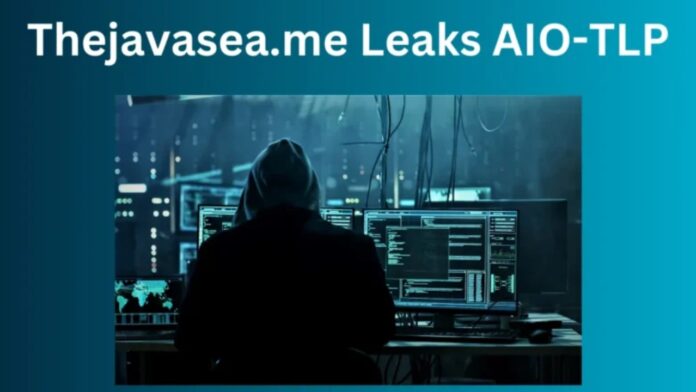Introduction
In the ever-evolving landscape of cybersecurity, the thejavasea.me leaks aio-tlp incident has emerged as a significant event, highlighting the vulnerabilities inherent in digital platforms and the potential consequences of data breaches.
This leak, involving a comprehensive suite of tools and sensitive information, has garnered attention from cybersecurity professionals, law enforcement agencies, and the general public alike.
The intent behind this article is to provide an in-depth analysis of the incident, its implications, and the lessons that can be learned to bolster digital security practices.
What Is thejavasea.me leaks aio-tlp?

thejavasea.me leaks aio-tlp refers to a significant data breach involving the exposure of a comprehensive toolkit and sensitive information on the platform known as thejavasea.me. The term “aio-tlp” stands for “All-In-One Threat Level Protocol,” a system designed to categorize and manage the dissemination of sensitive information. The leak encompassed a wide array of tools and data, including:
- Botnets for hire: Networks of compromised computers or IoT devices available for cyberattacks.
- Access to breached accounts: Login credentials for popular sites such as Amazon, Netflix, and PayPal.
- Zero-day exploits: Vulnerabilities in software or hardware that are unknown to the vendor and have not been patched.
- Payment fraud tools: Tools enabling unauthorized transactions and financial fraud.
The exposure of these resources has raised significant concerns regarding the accessibility of advanced cyberattack tools and the potential for widespread misuse.
The Intent Behind the Leak
The intent behind the thejavasea.me leaks aio-tlp appears to be multifaceted. For cybercriminals, the leak provides access to a comprehensive suite of tools that can be exploited for various malicious activities, including financial fraud, identity theft, and large-scale cyberattacks.
For researchers and cybersecurity professionals, the leak offers an opportunity to study the tools and methods employed by cybercriminals, potentially aiding in the development of countermeasures and defensive strategies.
However, the unintended consequence is the democratization of cyberattack capabilities, allowing individuals with limited technical expertise to launch sophisticated attacks. This shift has profound implications for the cybersecurity landscape, necessitating a reevaluation of current defense mechanisms and response strategies.
The Scope of the Leak
The thejavasea.me leaks aio-tlp incident is notable not only for the volume of data exposed but also for the diversity of tools and information involved. The leaked resources included:
- Advanced hacking tools: Software designed to exploit vulnerabilities in systems and networks.
- Sensitive user data: Personal information, including names, email addresses, and financial details.
- Proprietary business information: Internal documents, strategic plans, and intellectual property.
- Access credentials: Login information for various online platforms and services.
The breadth of the leak underscores the complexity and scale of modern cyber threats, highlighting the need for robust security measures across all sectors.
Implications for Individuals
For individuals, the thejavasea.me leaks aio-tlp incident poses several risks:
- Identity theft: Exposed personal information can be used to impersonate individuals and commit fraud.
- Phishing attacks: Cybercriminals can use the leaked data to craft convincing phishing messages, leading to further compromises.
- Financial loss: Unauthorized access to financial accounts can result in significant monetary losses.
Individuals affected by the leak are advised to monitor their accounts closely, change passwords, and enable two-factor authentication where possible to mitigate potential risks.
Implications for Businesses

Businesses, particularly small and medium-sized enterprises (SMEs), face heightened risks due to the exposure of sensitive information:
- Reputational damage: A data breach can erode customer trust and damage a company’s reputation.
- Financial repercussions: Costs associated with breach containment, legal fees, and potential fines can be substantial.
- Operational disruption: Cyberattacks can lead to downtime, loss of data, and disruption of services.
Organizations are encouraged to conduct thorough security audits, implement comprehensive cybersecurity policies, and invest in employee training to enhance resilience against such threats.
Legal and Regulatory Considerations
The thejavasea.me leaks aio-tlp incident has prompted legal and regulatory scrutiny:
- Data protection laws: Jurisdictions with stringent data protection regulations may impose penalties on organizations found to be negligent in safeguarding data.
- Cybercrime legislation: Law enforcement agencies may pursue criminal charges against individuals involved in the unauthorized dissemination of sensitive information.
- International cooperation: Given the global nature of the internet, international collaboration is essential in addressing cross-border cybercrimes.
Affected parties should consult legal professionals to understand their rights and obligations in the wake of the breach.
Response from thejavasea.me
In response to the leak, thejavasea.me has implemented several measures:
- Enhanced security protocols: Strengthening encryption and access controls to prevent unauthorized access.
- User notifications: Informing users of the breach and advising on protective actions.
- Collaboration with cybersecurity experts: Engaging with professionals to assess the breach and develop strategies to prevent future incidents.
While these steps are commendable, the effectiveness of the response will depend on the thoroughness of the actions taken and the transparency of communication with affected parties.
Community and User Reactions
The community’s reaction to the thejavasea.me leaks aio-tlp incident has been mixed:
- Concern and vigilance: Many users have expressed alarm over the exposure of sensitive information and the potential for misuse.
- Support for affected individuals: There has been a concerted effort to assist those impacted by the breach, including sharing resources and advice on protective measures.
- Calls for accountability: Users have demanded greater accountability from platforms hosting sensitive data and tools, advocating for stricter security measures and oversight.
These reactions underscore the importance of community engagement and collective responsibility in addressing cybersecurity challenges.
Lessons Learned
The thejavasea.me leaks aio-tlp incident offers several key lessons:
- The importance of robust security measures: Organizations must prioritize cybersecurity to protect sensitive data and maintain trust.
- The need for proactive monitoring: Regular audits and monitoring can help detect vulnerabilities before they are exploited.
- The value of transparency: Open communication with users and stakeholders is crucial in managing the aftermath of a breach.
- The necessity of legal compliance: Adherence to data protection laws and regulations is essential in mitigating legal risks.
By learning from this incident, organizations and individuals can strengthen their defenses against future cyber threats.
Final Thoughts
The thejavasea.me leaks aio-tlp incident should be a wake-up call for internet users and organizations alike. It highlights the importance of digital security, personal privacy, and ethical data sharing.
Leaks like this don’t just affect tech experts—they impact regular people who trust platforms to keep their information safe. If you suspect your data may have been compromised, take action immediately and stay vigilant. Always remember: in the digital world, protecting your data is protecting your identity.




